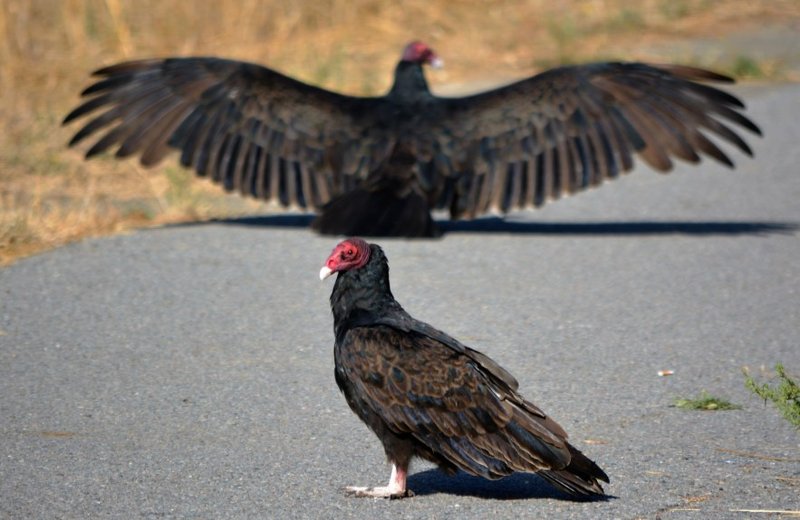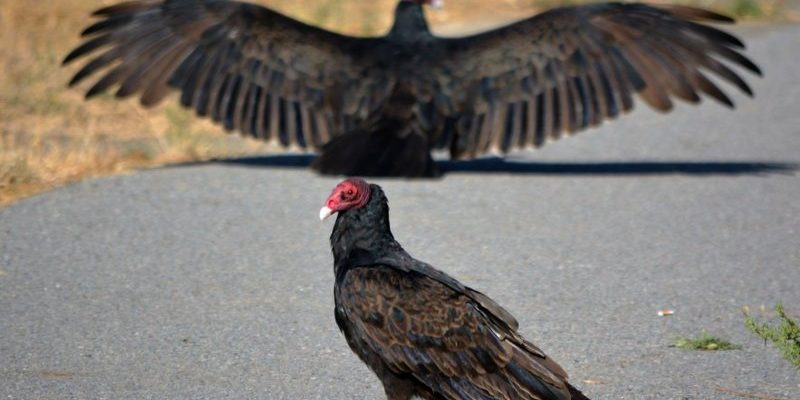
Let’s dig deeper into the world of turkey vultures. These fascinating creatures have unique adaptations that allow them to thrive in a variety of habitats. But their story is more than just survival; it’s about how they interact with their environment and contribute to the health of their ecosystems. So grab a cup of coffee, and let’s explore the essential role turkey vultures play!
Turkey Vultures: Quick Overview
Turkey vultures are large birds with broad wings and a distinctive red head. They can be found across North and South America, often soaring in search of food. Unlike other birds of prey, they have a keen sense of smell, which helps them detect carrion from miles away. This adaptation is crucial, as it allows them to find food sources quickly, even in remote areas.
Their diet mostly consists of dead animals, or carrion, which they locate through their excellent olfactory sense. Unlike some scavengers, turkey vultures do not kill their prey. Instead, they are nature’s recyclers, ensuring that no part of the ecosystem goes to waste. By consuming dead animals, they prevent the spread of disease and help maintain a balanced food web, akin to a natural waste management system in the animal kingdom.
The Importance of Scavengers
Scavengers like turkey vultures play a vital role in their ecosystems. Imagine walking through a park and coming across a dead animal. It’s not just an eyesore; it can attract pests and spread diseases. This is where turkey vultures shine. By eating these carcasses, they help prevent the spread of harmful bacteria and viruses that can impact both wildlife and humans.
Moreover, scavengers help recycle nutrients back into the environment. When turkey vultures consume carrion, they are not just cleaning up; they are breaking down organic matter and returning essential nutrients to the soil. This process enriches the earth, promoting the growth of plants, which in turn supports other wildlife. It’s a beautiful cycle that showcases the interconnectedness of life.
Turkey Vultures and Disease Control
One of the most crucial aspects of the turkey vulture’s role is disease control. When animals die, their bodies can become breeding grounds for bacteria and parasites. Left unchecked, these pathogens can spread to other animals, creating a larger health crisis. Turkey vultures, with their specialized digestive systems, are adapted to consume carrion that may contain harmful substances.
Their stomachs have strong acids that help neutralize pathogens, making them less likely to fall ill from the bacteria they ingest. Think of them as nature’s immune system, working tirelessly to keep the environment healthy. By consuming dead animals, they curb the potential for outbreaks and help maintain the integrity of ecosystems.
Turkey Vultures in Cultural Context
Turkey vultures have a mixed reputation in different cultures. While some view them as harbingers of death, others recognize their vital role in maintaining the balance of nature. In many cultures, they symbolize renewal and transformation. For Indigenous peoples, these birds often represent cleanliness and the cycle of life and death.
Beyond their cultural significance, turkey vultures serve as indicators of environmental health. Their presence in an ecosystem often signals that the environment is relatively clean and balanced. This unique perspective helps shift how we see these birds—not just as scavengers but as essential players in the health of our planet.
Habitat and Behavior of Turkey Vultures
Turkey vultures are quite adaptable when it comes to their habitats. You can find them in forests, grasslands, and even urban areas. They prefer open areas where they can soar high and spot potential food sources. When it comes to roosting, they often gather in groups, reflecting their social behavior.
Their foraging behavior is also fascinating. Turkey vultures rely on thermal updrafts to soar gracefully through the skies, saving energy while searching for food. Unlike other birds, they don’t have strong feet to grasp or tear into their meals. Instead, they use their sharp beaks to rip open carcasses. This unique adaptation allows them to efficiently consume their food without needing to rely on an elaborate hunting strategy.
Turkey Vultures and Conservation Efforts
Given their vital role in ecosystems, conservation efforts for turkey vultures are essential. Habitat loss, poisoning from ingesting carcasses treated with toxins, and collisions with vehicles pose significant threats to these birds. Educating the public about their ecological importance can help foster a positive perception and drive conservation initiatives.
Organizations and wildlife enthusiasts often promote safe environments for turkey vultures. Planting native species, creating safe feeding grounds, and reducing pesticide use can make significant differences. Every little effort counts in preserving these important birds and ensuring they continue to thrive in their natural habitats.
In summary, the turkey vulture’s role in its ecosystem is nothing short of remarkable. They are essential scavengers, natural recyclers, and guardians against disease, helping to maintain a balanced environment. By understanding their contributions, we can appreciate these birds more fully and advocate for their protection.
So, next time you see a turkey vulture soaring overhead, remember—they’re not just waiting for a meal; they’re playing a critical role in the health of our planet. Embracing this understanding can inspire us to respect and protect these unique creatures, ensuring they continue their invaluable work for generations to come.

